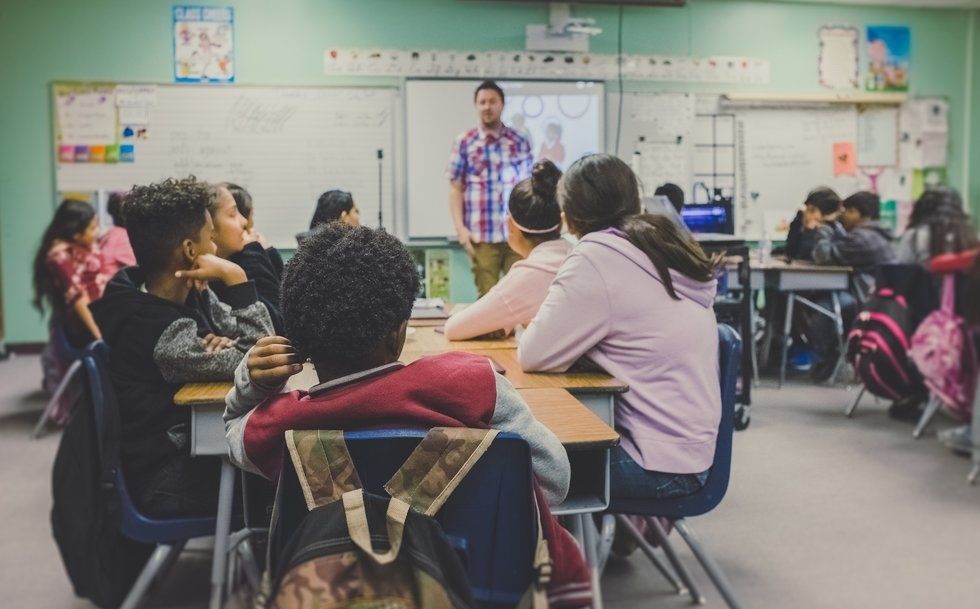Teachers have so many responsibilities.
They put their heart and soul into teaching children everything they'll need academically to prepare them for their future, whatever it may hold.
While we tend to value the academic skills good teachers coach students through, we don't often discuss the other valuable life skills the educators who spend hours each day with impressionable young minds can pass on. Especially during the early years of school, children are absorbing everything they can from the environment around them on how to make decisions and interact socially with others.
The best teachers set a good example and incorporate lessons that build "soft skills"—communication, organization, and mindset skills that are crucial in the modern workplace and everyday life. Here are 6 of the skills teachers can help improve in the classroom.
1. Resilience
People react differently to setbacks depending on their experiences with failure.
Resilience is an important skill that allows people to face challenging situations with persistence in the face of failure and to bounce back when roadblocks crop up.
School presents many challenges for children, and these formative years can have an enormous impact on whether or not students develop resilience.
Good teachers help their students to see failure and challenge as an opportunity for learning, growth, and improvement, rather than as evidence of lack of ability or intelligence. Children who are praised for their effort and perseverance rather than their successes along leads to more resilience as adults.
Life is challenging, and early lessons on resilience can be key to future success.
2. Curiosity and Creativity
The 2016 Gallup Employee Engagement Report showed that only 33% of Americans are engaged at work.
Engagement in the workplace is based on many factors, of course, but teachers can help kids become engaged and innovative members of society by building the skills of curiosity and creativity in the classroom.
During kindergarten to 3rd grade in particular, teachers' modeling of enthusiasm for learning can help set the course for future engagement in school and work.
Many teachers pique curiosity in their students by setting up creative experiments and allowing exploration through art, stories, and play.
3. Emotional Intelligence and Empathy
We're hard-wired to care about others, and most of us do, for the most part.
Empathy is a natural human response as a social animal, and yet, many people haven't developed enough empathy to sense others' emotions and act compassionately as adults.
Emotional intelligence is an important skillset for children to develop.
The pillars of empathy, along with self-regulation, social skills, motivation, and self-awareness, form a solid foundation for success in life, work, and relationships.
In Denmark, developing empathy is standard practice in schools, and teachers work with students to study and recognize emotion in others, discuss bullying from a young age, and help students become more compassionate towards others.
Good teachers understand the importance of teaching empathy in order to develop students into ethical and successful adults, and incorporate lessons on the subject on a regular basis, whether through formal curriculum or discussion of issues that arise.
4. Goal-Setting
With so much on our plates these days, taking the time to set achievable goals can be the difference between drowning amongst daily tasks or thriving and achieving your dreams.
Without being able to think critically about what needs to be done and organizing those to-dos by priority, overwhelm can quickly set in.
Students need to be able to evaluate objectively what is most important to stay productive and be effective at studying and working in the future. Good teachers help students develop these skills through time management exercises, discussion, and practical application.
Practical application is especially important.
Students need to not only understand how to set and achieve goals, but also the practical benefits of setting goals. The easiest way to guide students in this direction is to provide them with a goal planner.
There are tons of goal planners out there to pick from, but to be honest like most things few are actually quality.
I've gone through my fair share of goal planners and must say that the number one goal planner that I've found is the 90x goal planner. Not only is this planner well-organized, but it also features a ton of inspirational quotes from leading minds like Albert Einstein. Students absolutely love these inspirational quotes! Or at least mine always have.
5. Collaboration and Conflict Resolution
Many students work well on their own but struggle to work within a team.
Additionally, most people avoid conflict, and simply avoid talking about problems whenever possible. Working well with others is an essential skill that's perfect to teach in the classroom.
Teachers often assign students group projects and then step back, letting things work themselves out. In theory, it's a good idea, in reality, some students tend to take on more work than others and resentment follows. Great teachers help foster collaboration by staying involved in group projects—helping students understand their role and develop leadership skills.
Conflict resolution skill-building is a process, and students can progress through learning theories of effective conflict resolution, but also through their own experiences relating with one another.
Through these lessons, students communicate more effectively, build social skills, and set themselves up for a bright future.



















